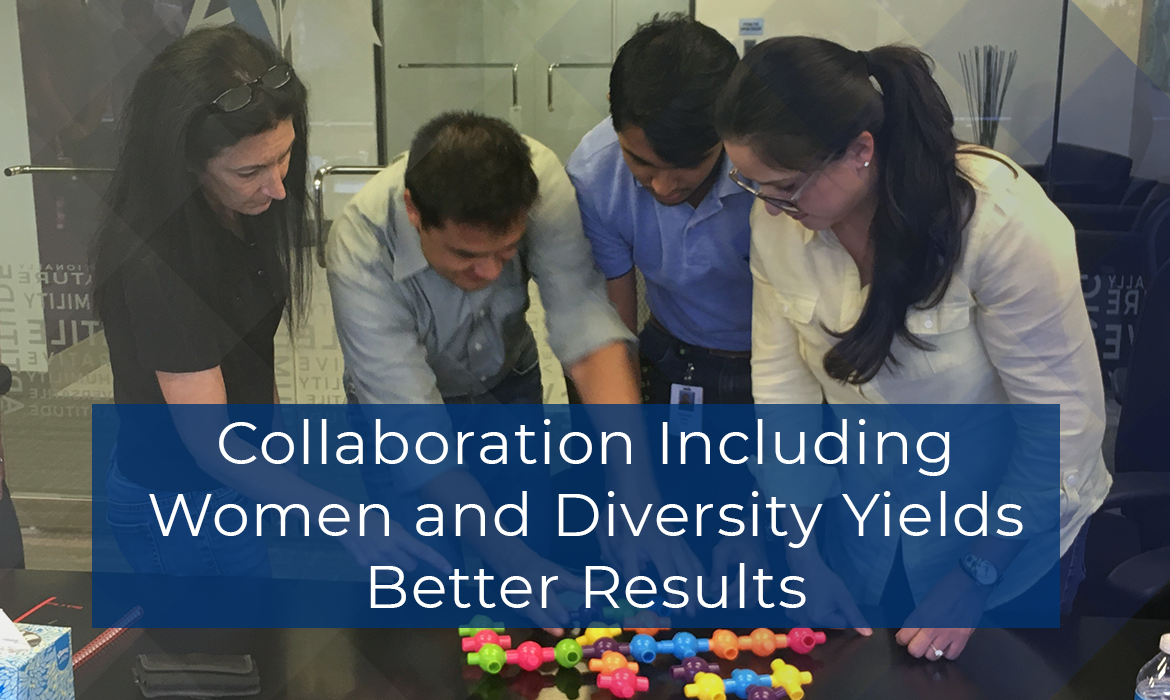Since 1904, the concept of "general intelligence" was widely accepted. The idea was that people who are good at one mental task tend to be good at many others. With changes in times and the workforce, the emergence of groups collaborating has become the mainstream way to generate ideas. The book, Change by Design, by Tim Brown, CEO of IDEO, encourages group-based thinking. The idea is collaboration produces more innovative ideas. A groups’ success will depend on its make-up which is why it’s important to consider two key ingredients: Women and Diversity.
Women in Groups
Studies show that female inclusion in groups leads to better outcomes. Women are better at reading emotional-cues which encourages everyone to share ideas freely without feeling judged. A test called the Reading the Mind in the Eyes (RME) showed that women scored higher and were able to sense feelings. Women proved to also have strong social cues when the test was altered and done online without facial cues. Higher social intelligence, led to higher collective intelligence, thus making the group smarter.
However, for some professions, this is harder to achieve since the men-to-women ratio is unbalanced. For example, there’s a low percentage of women entering STEM programs because of the stereotypes around math and sciences being stronger in men than women even though the key skills in STEM-related fields, including spatial skills and growth-mindset, are acquired skills through learning. Studies have shown that there is no evidence that sex plays a difference in the biological make-up of the brain.
Diversity in Groups
Diversity within a group and inclusion is shown to enable making better business decisions. Inclusive teams make better business decisions up to 87% of the time and 2x faster with ½ the meetings. Huffington Post states “people who bring different experiences, skills and backgrounds to group decision-making process force the group members to examine more alternatives, prepare better for decision-making, and anticipate different viewpoints. The variety of ideas that come up in diverse groups is one source of this outperformance, and another is more careful information processing that happens in more diverse groups.”
Exposure to different groups and different ideas helps your brain overcome its stale way of thinking and help you see a new perspective. You are more aware of personal biases and more aware of other’s scrutiny against those biases, thus increasing your ability to better contribute to the group.
What’s next?
Collaboration is going to become increasingly important as more Millennials enter the workforce. In a world with information at our fingertips, traditional skill sets such as spelling and adding, will become obsolete. There’s a machine to do that and that will only increase as AI continues to evolve. People will be able to curate ideas from the internet but it’s the people's interaction and process in solving decisions that won’t be able to be replaced. Recognizing the importance of groups within an organization will be important and ensuring that these groups are inclusive of women, diverse background and different experiences will only increase a company’s chances of success.
Interested in learning more?
Delfina Govia, Partner of Veritas Total Solutions, will be leading a panel called How to Live for 300 Years – Maximize Your Personal and Professional Life at the upcoming Women’s in Leadership Conference on Friday, February 14th. To register or for more information, click here: https://business.rice.edu/women-leadership-conference.
At Veritas, we encourage collaboration, female inclusion and diversity. Our workforce is approximately 40% female, higher than the industry average of 25%, with employees having backgrounds from multiple nationalities. Our differences fuel our innovative way of thinking. For more information on our strategy and transformation consulting services, contact info@veritasts.com.

